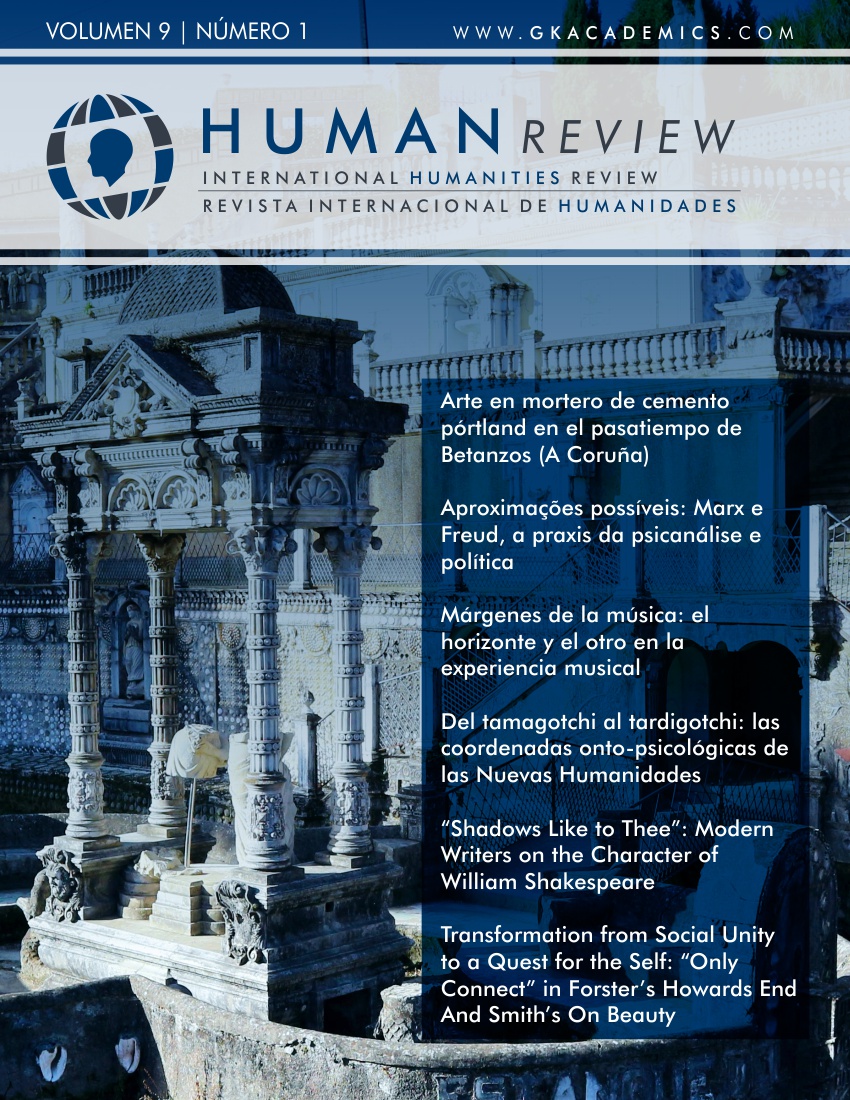Borders of Music: The Horizon and the Other in Musical Experience
DOI:
https://doi.org/10.37467/gka-revhuman.v9.2496Keywords:
Music, Communication, Other, Horizon, EthicsAbstract
The sound recording and reproduction systems and the development without precedents of communication technologies consitute decisive elements for thinking music nowadays. In this context, the present article brings into dialogue two questions. In the first place, the question of the essence of music from the conquest of ubiquity with the appearance of Internet. Secondly, the question about the other in musical experience, addressing the concert as a communicative situation.
References
Adorno, T. (2000). Sobre la música. Traducción de Gerard Vilar. Barcelona: Paidós.
Adorno, T. (2003). Filosofía de la nueva música. Traducción de Alfredo Brotons. Madrid: Akal.
Benjamin, W. (2003). La obra de arte en la época de su reproductibilidad técnica. Traducción de Andrés E. Welkert. México D.F.: Ítaca.
Berio, L. (2019). Un recuerdo al futuro. Traducción de Rosa Rius y Pere Salvat. Barcelona: Acantilado.
Born, G. (2011). Music and the materialization of identities. Journal of Material Culture 16(4), 376-388.
Charles, D. (1978). Le temps de la voix. Paris: JP Delarge.
Craft, R. (1991). Conversaciones con Igor Stravinsky (trad. de José María Martín Triana). Madrid: Alianza.
Corbin, A. (2019). Historia del silencio. Del Renacimiento hasta nuestros días (trad. de Jordi Bayod). Barcelona: Acantilado.
Dahl, P. (2019). Where is the essence of a musical work? En R. Staneviciuté, N. Zangwill, R. Povilionienè (eds.), Of Essence and Context. Between Music and Philosophy (pp. 197-211). Cham (Switzerland): Springer.
Deleuze, G. y Guattari, F. (2002). Mil mesetas. Capitalismo y esquizofrenia (trad. de José Vázquez Pérez y Umbelina Larraceleta). Valencia: Pre-Textos.
Dewey, J. (2005). Art as Experience. New York: Penguin.
Fubini, E. (2007). Música y estética en la época medieval (ed. y trad. de textos latinos a cargo de Cecilia Criado). Pamplona: EUNSA.
Heidegger, M. (1991). La proposición del fundamento (trad. de Félix Duque y Jorge Pérez de Tudela). Barcelona: Ediciones del Serbal.
Hersch, J. (2013). Tiempo y música (trad. de Rosa Rius y Ramón Andrés). Barcelona: Acantilado.
Hobsbawm, E. (2013). Un tiempo de rupturas. sociedad y cultura en el siglo XX (trad. de Cecilia Belza y Gonzalo García). Barcelona: Crítica.
Huizinga, J. (2007). Homo ludens (trad. de Eugenio Imaz). Madrid: Alianza.
Husserl, E. (2008). La crisis de las ciencias europeas y la fenomenología trascendental (trad. y estudio preliminar de Julia V. Iribarne). Buenos Aires: Prometeo.
Lejeune, P. (1975). Le pacte autobiographique. Paris: Seuil.
Lippman, A. (1964). Musical Thought in Ancient Greece. New York: Columbia University Press.
Steiner, G. (2007). Los logócratas (trad. de María Condor). México D.F.: Fondo de Cultura Económica; Siruela.
Steiner, G. (2012). La poesía del pensamiento (trad. de María Condor). Buenos Aires: Fondo de Cultura Económica; Siruela.
Stravinsky, I. (2005). Crónicas de mi vida (trad. de Elena Vilallonga Serra). Barcelona: Alba.
Valery, P. (1999). Piezas sobre arte. (trad. de José Luis Arántegui). Madrid: Visor.
Weil, S. (2018). Primeros escritos filosóficos (trad. de Teresa Escartín y José Luís Escartín). Madrid: Trotta.
Winocur, R. (2010). Robinson Crusoe ya tiene celular. México D.F.: Siglo XXI.
Downloads
Published
How to Cite
Issue
Section
License
Those authors who publish in this journal accept the following terms:
- Authors will keep the moral right of the work and they will transfer the commercial rights.
- After 1 year from publication, the work shall thereafter be open access online on our website, but will retain copyright.
- In the event that the authors wish to assign an Creative Commons (CC) license, they may request it by writing to publishing@eagora.org









